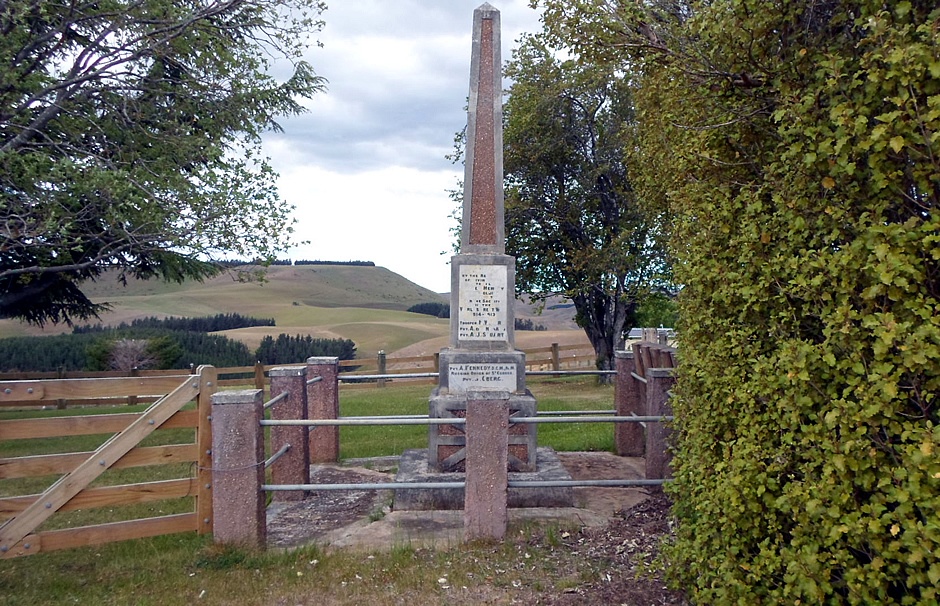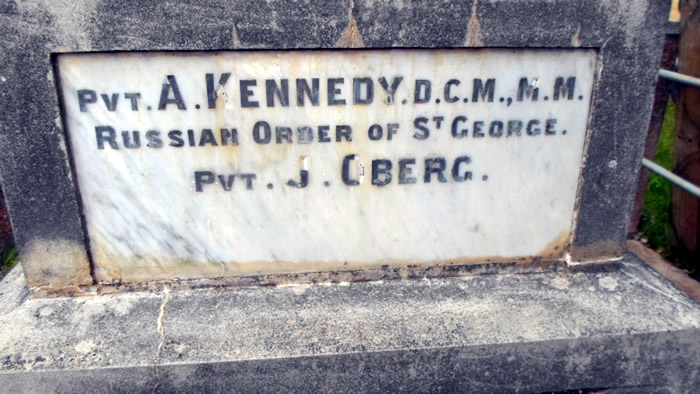
Alexander Kennedy lived in Oamaru and was a labourer for a local meat company when he joined the army in late 1916. He was in action before a year was out. He was also, before the year turned around, dead. Private Alexander Kennedy is one of the seven New Zealanders who were awarded medals from the Russian Empire during the First World War.
At Oamaru yesterday, Sir James Allen presented to Mr D. Kennedy a Distinguished Conduct Medal, won in France by his son, Private Alexander Kennedy, who was subsequently killed in action. The Mayor, replying on behalf of Mr Kennedy, said he felt his loss very much, but appreciated the distinction won by his son. Mr Frith went on to say that he, himself, had known the late Private Kennedy, or "Togo" as he was popularly called, since he was quite a boy. He had read letters from the front from both officers and privates, and all were loud in their praises of their fallen comrade. He had gone to his gun and worked it singlehanded against terrible odds on a day when the fighting was fiercest and thus won the decoration, only to be killed the day before he was to have received it from the hands of General Godley. -Evening Star, 22/2/1917.
The Territorials and Senior Cadets of the North Otago district will be paraded in the precincts of the Oamaru railway station in readiness for the arrival of the Governor-General to-morrow, and His Excellency will make three presentations — the Military Cross to the relatives of .Lieutenant E. H. Kibblewhite; the Russian medal of St. George (third class) to the relatives of Private Alexander Kennedy, who previously won the Military Medal; and the Victoria Cross to the relatives of Sergeant Donald Forester Brown, son of Mr Robert Brown, draper, now of Oamaru, formerly of George street, Dunedin. Sergeant Brown belonged to the No. 10 North Otago and the act by which he earned the much-coveted honor "for valor" was rushing a machine gun in the battle of the Somme. These three fearless men are dead, hence the presentations to their representatives. -Evening Star, 29/8/1917.
The action in which Alexander won the Medal of St George (and presumably the DCM) is described very briefly thus: "During the night of 2/3rd July, when serving his Lewis Gun he was twice blown out of his position but on each occasion got his gun into action again."
This conduct is certainly worth celebrating, but the Official History of the Otago Regiment doesn't mention any action on the date shown. The Somme Offensive had begun by then, but the Otagos were held in reserve for it until September. There also seems to be no recorded action on the day that Alexander died, just over two weeks after his stalwart actions with his machine gun. The notation on his military record has no more details of his death beyond "Killed in action."
Why was Alexander awarded a Russian medal? It's my understanding that the awards of such medals were made for political and/or propaganda reasons, in order to foster a sense of solidarity between the armies fighting the Central Powers. A number of medals would be allotted to the British Army (of which the NZEF was a part) and would be made by Generals to deserving recipients.
 |
| Photo courtesy of the NZ Ministry for Culture and Heritage. |
AWARDS FOR BRAVERY.
(Per Press Association.)
Oamarn, August 30.
The Governor General paid a brief visit to the town today to present awards made to Oamaru soldiers for bravery at the front. There was a good turnout of Territorials and a big gathering of the public. All the earners of the awards being dead there was no outburst of enthusiasm on presentations to the next of kin. They were as follows Sergeant Donald Foreste Brown, Victoria Cross to Robert Brown, father; Lieutenant Edward H. Kibblewhite, Military Cross, to Mrs Kibblewhite, wife; Private Alexander Kennedy, Russian Order of St. George, to D. Kennedy, father. -Rangetiki Advocate and Manawatu Argus, 30/7/1917.
MILITARY VALOUR.
AWARDS TO NORTH OTAGO SOLDIERS.
VISIT OF HIS EXCELLENCY, THE GOVERNOR-GENERAL.
PRESENTATION OF MEDALS. (excerpt)
The notice of the conferring of the Russian Medal of St George upon Private Alexander Kennedy was then read as follows: Extract, from Sixth Supplement to the London Gazette, dated 13th February, 1917: Decorations and medals conferred by Field-Marshal His Imperial Majesty the Emperor of Russia - Medal of St. George (3rd class) — 8/3057, Private Alexander Kennedy, late Otago Regiment, New Zealand Force.
His Excellency, the Governor-General then handed the medal to Mr D. Kennedy.
The ceremony then concluded, and the Governor-General proceeded north by the express.
Yesterday morning the Mayor received the following telegram from Colonel the Hon. Sir James Allen (Minister of Defence) in connection with the occasion:— "It is a disappointment to me that official duties-prevent my being in Oaniaru to-day to join with the citizens in doing honour to the memory of three such distinguished and gallant soldiers as the late Sergeant Donald Forrester-Brown, the late Lieutenant Kibblewhite, M.C., and the late Private A. Kennedy, D.C.M., to whom has also been awarded the Russian Medal of St. George (3rd class). I shall be glad if you will convey my congratulations to the respective next-of-kin, coupled with my sincere regret that these soldiers have not been spared to receive in person their well-merited honours. The splendid example of' self-sacrificing heroism and devotion to duty set by the three deceased soldiers must be cause for pride on the part of their fellow-citizens of Oamaru, and I hope to-day's parade will be an inspiration to all present, especially to the Territorials and Cadets, to carry into their civic and private life the high traditions so worthily set them by their late fellow-citizens."
Great interest was, of course, shown in the medals presented, and those who received them were the recipients of many congratulations. The design of the Victoria Cross is well-known. It is in the form of a Maltese Cross, and is made of bronze; in the centre on the obverse side is the royal crown surmounted by a lion, and on a scroll below it are the words "For Valour.'' The ribbon for the Army award is red. On the clasp are engraved two branches of laurel, and from it the cross is supported by the initial V. On the inverse side the cross bears the date of the deed for which the award was made, while on the clasp is the name of the recipient. The Military Cross is of very chaste design, in plain silver bars with pointed tips. In the centre on the obverse side is the royal monogram, while each point of the cross is engrossed with the royal crown. The Russian Medal of St, George is a plain circular silver medal bearing on the obverse side a stamp of the head of the Emperor of Russia, and on the inverse an inscription of the Order. -North Otago Times, 31/8/1917.
 |
| Photo courtesy of the NZ Ministry for Culture and Heritage. |
No comments:
Post a Comment